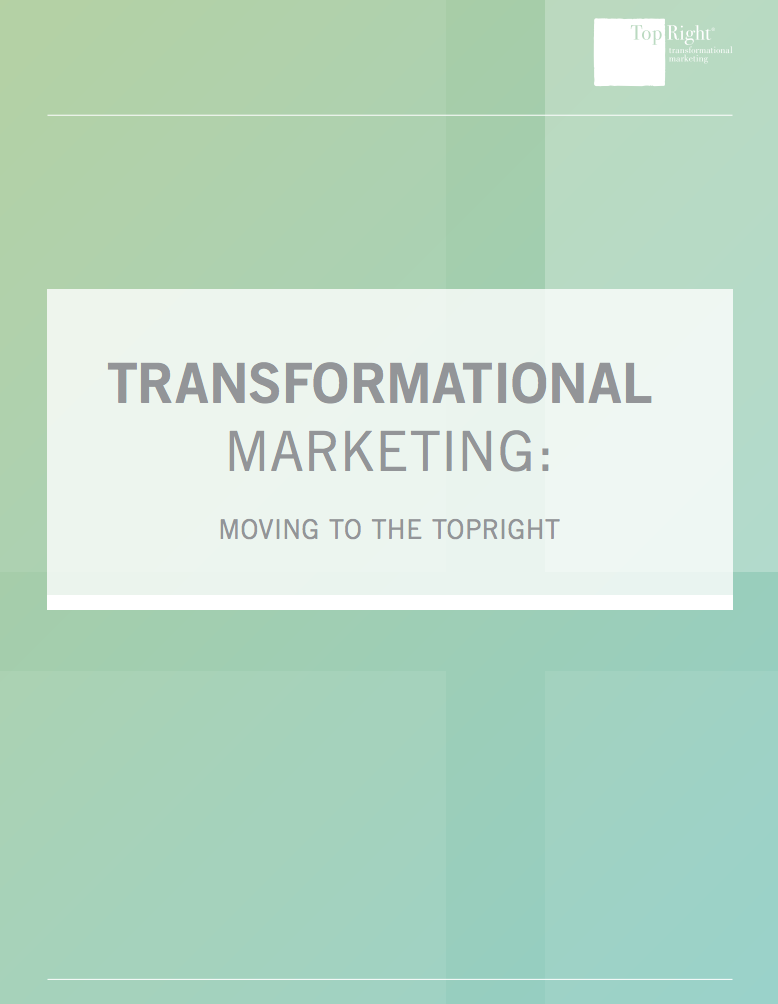The explosion of digital, the empowered customer, and the acceleration of innovation are having a profound impact on customer experiences and expectations. Driving customer demand no longer relies on the best creative copy or the most entertaining tag-lines. It relies on an analytical, psychological, and perhaps even anthropological understanding of the customer.
Companies can no longer rely on “the way things have always been done” to generate demand. Instead, they must find new, innovative ways to engage consumers. Many brands are realizing the first step of innovation is re-imagining the entire organizational structure – aka internal disruption.
On deck to ignite this change is a special breed of marketer: the Transformational CMO.
Bruce Rogers, the Chief Insights Officer of Forbes and leader of Forbes’ CMO Practice, recently provided insight into the unique skill set of Transformational CMOs, and how it differentiates them from the rest of the pack.
“They have a fundamental understanding of the levers of growth, have insight on the relative importance and value of these levers, and know how to convert this understanding into enterprise-wide action that drives overall performance.”
—Bruce Rogers
In Kim Whitler’s Forbes article The Rise Of The Transformational CMO: Forbes’ Chief Insights Officer Provides Perspective, Rogers identified three basic questions that Transformational CMOs have to be concerned with:
1) What are the tools in my marketing toolbox that have the greatest impact on customers?
2) How do the marketing tools interact with the other functional tools to drive overall business outcomes?
3) And how do I transform the entire enterprise to create a more seamless and value creating experience for the customer?
“Where do you put the fear when you choose to innovate? The fear is there, but you have to find a place to put it.”
— Seth Godin
Here are the 7 key characteristics and/or skills a Transformational CMO must possess.
1. Lean and agile
Transformational CMOs must have an understanding of lean and agile principles, and the ability to apply those principles across all systems and strategies. The “always be shipping” approach must be aligned across departments—IT can’t run on two-week sprints while Marketing runs on six-month “marathons”.
2. Performance driven
Transformational CMOs are results driven and measure success with KPIs clearly linked to business performance. These CMOs have an in-depth understanding of business operations, an analytical approach to problem solving, and the ability to inspire others to action. They build a culture of execution.
3. Ability to break down organizational silos
In addition to partnering with the CEO to grow the business, it is the Transformational CMO’s responsibility to break down organizational silos and bring internal alignment to departments and technology stacks. By quickly identifying and resolving time wasters and bottlenecks, Transformational CMOs are able to build momentum and drive growth.
4. MarTech expertise to align technology across all business functions
Transformational CMOs use their understanding of Marketing Technology software to assess how it relates to the distinct needs of the organization.Technology stacks should integrate across departments to create a comprehensive customer view. With 3,874 marketing technology solutions, this is becoming a more daunting task than ever. Does the software align and connect to your existing systems? Does it integrate seamlessly with other business applications? Does it effectively drive customer awareness?
5. Ability to lead company wide change
In order to lead organizational change, the CMO must be able – not just willing – to work with multiple stakeholders, managers, and teams. From partnering with HR on Employer Branding to working with customer service to QA testing new products/services to compiling and analyzing data, Transformational CMOs work closely with other departments. They have authentic and frequent interactions with IT, HR, and Finance to ensure the enterprise is creating a seamless and valuable customer experience.
6. Deep understanding of customer behavior and journey
Transformational CMOs go beyond just crunching the data; they actually talk to the customer and perform customer discovery. They ask, “What, if anything, could we do better?” These CMOs look beyond just marketing metrics and review how the entire enterprise is engaging the customer. By developing a deep understanding of pain points and the overall customer journey, Transformational CMOs are able to create a simple and compelling brand story that makes customers want to engage.
7. Ability to convert analytical insight into solutions that drive demand
As Rogers points out, it’s much easier and less complicated to cut costs than it is to drive topline growth. Not only is this task challenging, it is one of the most vital to transformational change and perhaps even moving to the corner office. Rogers recommends hiring a CMO that can step into a CEO role to get more value out of the marketing department.
“CMOs who can demonstrate an understanding of what drives customer demand and then align the firm’s operations to act on the insight will increasingly move to the corner office.”
—Bruce Rogers
In addition to possessing these skills and abilities, Transformational CMOs have 3 major obstacles to overcome: Simplicity in Story, Clarity in Strategy, and Alignment in Systems. Based on our collective experiences helping brands move to the TopRight corner of the market, we have compiled an ebook to help you ignite transformational change within your organization.
If you want to learn how to transform your marketing, engage your customers, and grow your business then this ebook is for you. Simply tell us your current marketing challenge and get FREE access to TRANSFORMATIONAL MARKETING: Moving to the TopRight [ebook].
